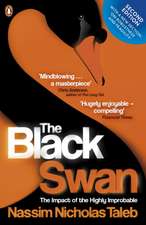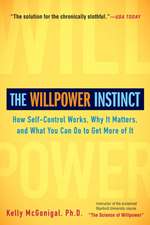Thinking, Fast and Slow: Biblioteca Antreprenoria, cărți recomandate de Dan Ștefan, Autonom
Autor Daniel Kahnemanen Limba Engleză Paperback – 10 mai 2012
| Toate formatele și edițiile | Preț | Express |
|---|---|---|
| Paperback (2) | 84.64 lei 25-31 zile | +38.68 lei 5-11 zile |
| Penguin Books – 10 mai 2012 | 84.64 lei 25-31 zile | +38.68 lei 5-11 zile |
| MACMILLAN USA – 2 apr 2013 | 99.52 lei 22-36 zile | +22.38 lei 5-11 zile |
| Hardback (1) | 220.12 lei 22-36 zile | |
| MACMILLAN USA – 25 oct 2011 | 220.12 lei 22-36 zile |
Din seria Biblioteca Antreprenoria, cărți recomandate de Dan Ștefan, Autonom
- 31%
 Preț: 70.33 lei
Preț: 70.33 lei -
 Preț: 197.49 lei
Preț: 197.49 lei - 19%
 Preț: 94.96 lei
Preț: 94.96 lei - 20%
 Preț: 71.04 lei
Preț: 71.04 lei - 22%
 Preț: 70.10 lei
Preț: 70.10 lei - 20%
 Preț: 71.04 lei
Preț: 71.04 lei - 18%
 Preț: 74.47 lei
Preț: 74.47 lei -
 Preț: 81.91 lei
Preț: 81.91 lei - 27%
 Preț: 65.15 lei
Preț: 65.15 lei - 19%
 Preț: 107.81 lei
Preț: 107.81 lei - 18%
 Preț: 75.14 lei
Preț: 75.14 lei - 20%
 Preț: 66.43 lei
Preț: 66.43 lei -
 Preț: 69.02 lei
Preț: 69.02 lei - 23%
 Preț: 58.50 lei
Preț: 58.50 lei -
 Preț: 137.71 lei
Preț: 137.71 lei - 23%
 Preț: 80.24 lei
Preț: 80.24 lei
Preț: 84.64 lei
Preț vechi: 104.32 lei
-19% Recomandat
14.97€ • 17.66$ • 13.11£
Carte disponibilă
Livrare economică 26 martie-01 aprilie
Livrare express 06-12 martie pentru 48.67 lei
Specificații
ISBN-10: 0141033576
Pagini: 610
Dimensiuni: 128 x 195 x 30 mm
Greutate: 0.43 kg
Editura: Penguin Books
Colecția Penguin Classics
Seriile Biblioteca Antreprenoria, cărți recomandate de Dan Ștefan, Autonom, Book Club Andreea Roșca, Best Business Books, Best Business Books of 2019, Thinking Fast and Slow, Recomandări cărți Ecommerce - Școala de vară GPeC 2019, New York Times Bestsellers 2020, New York Times Bestsellers, New York Times Bestsellers - Business, Recomandări Bookups, Autori cu Premiul Nobel în Economie
Locul publicării:London, United Kingdom
Notă biografică
Daniel Kahneman is a Senior Scholar at Princeton University, and Emeritus Professor of Public Affairs, Woodrow Wilson School of Public and International Affairs. He was awarded the Nobel Prize in Economics in 2002.
Recenzii
Absorbing, intriguing...By making us aware of our minds' tricks, Kahneman hopes to inspire individuals and organisations to identify strategies to outwit them
Profound . . . As Copernicus removed the Earth from the centre of the universe and Darwin knocked humans off their biological perch, Mr. Kahneman has shown that we are not the paragons of reason we assume ourselves to be
[Thinking, Fast and Slow] is wonderful, of course. To anyone with the slightest interest in the workings of his own mind, it is so rich and fascinating that any summary would seem absurd
It is an astonishingly rich book: lucid, profound, full of intellectual surprises and self-help value. It is consistently entertaining and frequently touching, especially when Kahneman is recounting his collaboration with Tversky . . . So impressive is its vision of flawed human reason that the New York Times columnist David Brooks recently declared that Kahneman and Tversky's work 'will be remembered hundreds of years from now,' and that it is 'a crucial pivot point in the way we see ourselves.' They are, Brooks said, 'like the Lewis and Clark of the mind' . . . By the time I got to the end of Thinking, Fast and Slow, my skeptical frown had long since given way to a grin of intellectual satisfaction. Appraising the book by the peak-end rule, I overconfidently urge everyone to buy and read it. But for those who are merely interested in Kahenman's takeaway on the Malcolm Gladwell question it is this: If you've had 10,000 hours of training in a predictable, rapid-feedback environment-chess, firefighting, anesthesiology-then blink. In all other cases, think
[Kahneman's] disarmingly simple experiments have profoundly changed the way that we think about thinking . . . We like to see ourselves as a Promethean species, uniquely endowed with the gift of reason. But Mr. Kahneman's simple experiments reveal a very different mind, stuffed full of habits that, in most situations, lead us astray
This is a landmark book in social thought, in the same league as The Wealth of Nations by Adam Smith and The Interpretation of Dreams by Sigmund Freud
Daniel Kahneman is among the most influential psychologists in history and certainly the most important psychologist alive today...The appearance of Thinking, Fast and Slow is a major event
Daniel Kahneman is one of the most original and interesting thinkers of our time. There may be no other person on the planet who better understands how and why we make the choices we make. In this absolutely amazing book, he shares a lifetime's worth of wisdom presented in a manner that is simple and engaging, but nonetheless stunningly profound. This book is a must read for anyone with a curious mind
This book is a tour de force by an intellectual giant; it is readable, wise, and deep. Buy it fast. Read it slowly and repeatedly. It will change the way you think, on the job, about the world, and in your own life
[A] tour de force of psychological insight, research explication and compelling narrative that brings together in one volume the high points of Mr. Kahneman's notable contributions, over five decades, to the study of human judgment, decision-making and choice . . . Thanks to the elegance and force of his ideas, and the robustness of the evidence he offers for them, he has helped us to a new understanding of our divided minds-and our whole selves
Thinking, Fast and Slow is a masterpiece - a brilliant and engaging intellectual saga by one of the greatest psychologists and deepest thinkers of our time. Kahneman should be parking a Pulitzer next to his Nobel Prize
A major intellectual event . . . The work of Kahneman and Tversky was a crucial pivot point in the way we see ourselves
Kahneman provides a detailed, yet accessible, description of the psychological mechanisms involved in making decisions
This book is one of the few that must be counted as mandatory reading for anyone interested in the Internet, even though it doesn't claim to be about that. Before computer networking got cheap and ubiquitous, the sheer inefficiency of communication dampened the effects of the quirks of human psychology on macro scale events. No more. We must now confront how we really are in order to make sense of our world and not screw it up. Daniel Kahneman has discovered a path to make it possible
For anyone interested in economics, cognitive science, psychology, and, in short, human behavior, this is the book of the year. Before Malcolm Gladwell and Freakonomics, there was Daniel Kahneman who invented the field of behavior economics, won a Nobel...and now explains how we think and make choices. Here's an easy choice: read this
I will never think about thinking quite the same. [Thinking, Fast and Slow] is a monumental achievement
A terrific unpicking of human rationality and irrationality - could hardly have been published at a better moment. Kahnemann is the godfather of behavioural economics, and this distillation of a lifetime's thinking about why we make bad decisions - about everything from money to love - is full of brilliant anecdote and wisdom. It is Kahnemann's belief that anyone who thinks they know exactly what is going on hasn't understood the question; as such it's the perfect gift for opinionated family members everywhere.
The book I most want to be given is Thinking, Fast and Slow by Daniel Kahneman. I'm a speedy thinker myself, so am hoping to be endorsed in that practice.
Descriere scurtă
The phenomenal New York Times Bestseller by Nobel Prize-winner Daniel Kahneman, Thinking Fast and Slow offers a whole new look at the way our minds work, and how we make decisions.
Why is there more chance we'll believe something if it's in a bold type face? Why are judges more likely to deny parole before lunch? Why do we assume a good-looking person will be more competent? The answer lies in the two ways we make choices: fast, intuitive thinking, and slow, rational thinking. This book reveals how our minds are tripped up by error and prejudice (even when we think we are being logical), and gives you practical techniques for slower, smarter thinking. It will enable to you make better decisions at work, at home, and in everything you do.
Descriere
#1 Bestseller
The phenomenal New York Times Bestseller by Nobel Prize-winner Daniel Kahneman, Thinking Fast and Slow offers a whole new look at the way our minds work, and how we make decisions.
Why is there more chance we'll believe something if it's in a bold type face? Why are judges more likely to deny parole before lunch? Why do we assume a good-looking person will be more competent? The answer lies in the two ways we make choices: fast, intuitive thinking, and slow, rational thinking. This book reveals how our minds are tripped up by error and prejudice (even when we think we are being logical), and gives you practical techniques for slower, smarter thinking. It will enable to you make better decisions at work, at home, and in everything you do.

















